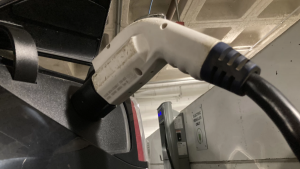COLUMBUS, Ohio (Statehouse News Bureau) — Drivers of electric cars will find it easier to get a jolt at fast-chargers. More EV charging stations are being installed in Ohio.

Badanes said this is the second phase of a five-year long project that’s being accomplished as part of the federal National Electric Vehicle Infrastructure (NEVI) program.
“Ohio is awarding nearly $16 million to install 22 new electric vehicle charging stations along the state’s interstates, state routes and U.S routes,” Badanes said. “This is in addition to about 23 new stations that are currently under construction.”
In 2021, Congress and the Biden administration committed $7.5 billion for electric vehicle chargers to be built around the country through the NEVI program. It took two years before Ohio became the first state to announce it would get some of that money, and in December the state opened up the first operational charging stations.
The charging isn’t free, but the stations have kicked in money to install the chargers. They’ll be located near interstates at sites considered safe that are open 24/7 and have restrooms and food.
“Once we are complete and we have spent all $140 million that’s been allotted to Ohio, we are expecting to have probably at least 100 new fast-charging EV stations throughout the state,” Badanes said.
Badanes said the process of installing chargers will continue and should be complete by 2028. Once complete, Badanes says there should be charging stations available within 50 miles at every part of the state.

